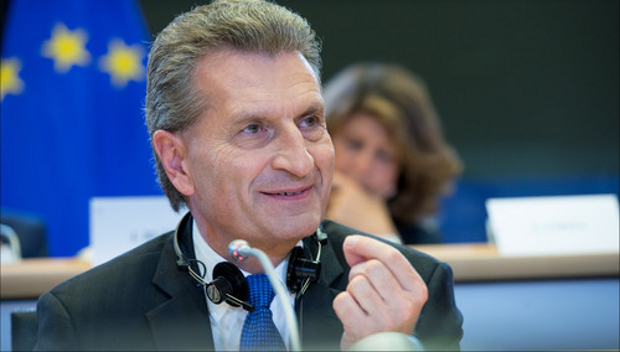Günther Oettinger, the European Union’s proposed Commissioner for the Digital Economy and Society, gave a disappointing performance at his confirmation hearing, dodging questions and calling the victims of a recent data breach “dumb”.
Critics said Oettinger’s remarks about the celebrities whose iCloud accounts were compromised, allowing hackers to release nude photos of them, showed he was unfit for the job of shoring up public confidence in the Internet.
During the three-hour confirmation hearing before Members of the European Parliament (MEPs) late Monday, Oettinger said he couldn’t believe the public lamentations over the nude celebrity photo incident.
“If someone is dumb enough to as a celebrity take a nude photo of themselves and put it online, they surely can’t expect us to protect them. I mean, stupidity is something you cannot – or only partly – save people from,” he said.
Though he said his remark was only “semi-serious,” it certainly rubbed people the wrong way.
What happened to these celebrities happens to regular people every day, but it just doesn’t make the news, said Julia Reda, MEP for the European Pirate Party.
“If you manage to look beyond the tabloid celebrity/sex angle, the statement is unbelievable: The person applying to be in charge of shoring up trust in the Internet so that Europeans do more business online just victim-blamed people whose personal data was accessed and spread without authorisation,” Reda said.
“There are many lessons to be learned from the celebrity photo incident that are politically relevant, for example about cloud security, digital literacy, software usability, and society’s sexism. It’s only to those unfamiliar with any of these topics that it’s just a half-joke,” she said. “Oettinger is seriously calling into question whether he is qualified for the job of shaping the EU’s digital society for the next five years.”
Oettinger, a German who is currently the EU’s Commissioner for Energy, is designated to take over as the EU’s digital Commissioner from Neelie Kroes on 1 November.
Other questions he fielded from MEPs during the hearing included his views on fundamental rights on the Internet, net neutrality, data protection, mass surveillance and cloud computing.
Right to be forgotten
The right to have outdated or irrelevant personal information removed from search engines – the so-called right to be forgotten enshrined in a May ruling by the Court of Justice of the European Union – is a “fundamental right,” he said.
Effective data protection is only possible on an EU level, he said. And if there are negotiations with the US about surveillance and data storage, the EU needs a strictly defined European position.
Net neutrality rules, Oettinger said, can be departed from, but only where this a public interest, a remark that French civil rights group La Quadrature du Net found “extremely worrying” because this means that he favours the idea of a two-tiered Internet.
“The position of Mr. Oettinger on net neutrality shows not only that he knows nothing about the critical issues it covers, but also that he is willing to bow to lobbying by telecom operators,” said Félix Tréguer, a founding member of the group.
Discussing cloud computing, he said that he didn’t have any plans to draw up legislation in that sector in the next year.
However, he was keen to unite the still fragmented European digital markets. “We still have 28 digital economies at the moment,” he said. A fragmented market is not going to work if you want to protect data, he said, adding that a single EU digital internal market is needed to do that.
He dodged a question about his plans, if any, to support free software, saying nothing on the subject, an omission La Quadrature du Net called “shameful“.
Oettinger will only get to work on these issues if he wins the confidence of MEPs who, following evaluations by parliamentary committees of the candidates for the various Commissioner posts, will soon vote on whether to support them.
Loek Essers, IDG News Service








Subscribers 0
Fans 0
Followers 0
Followers